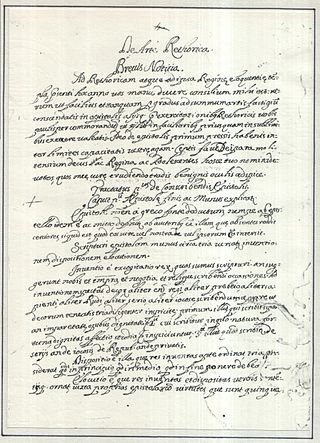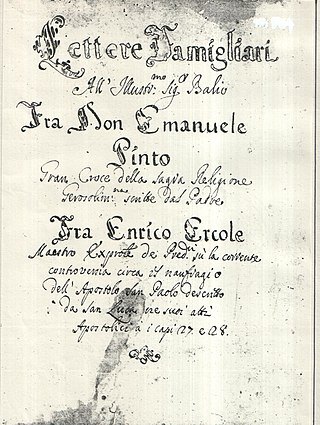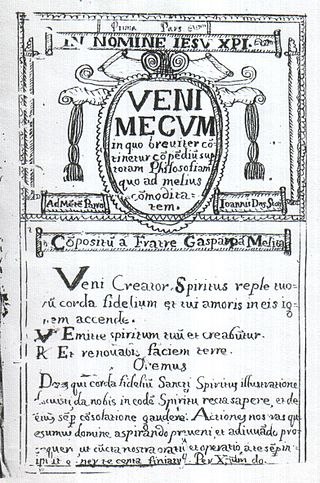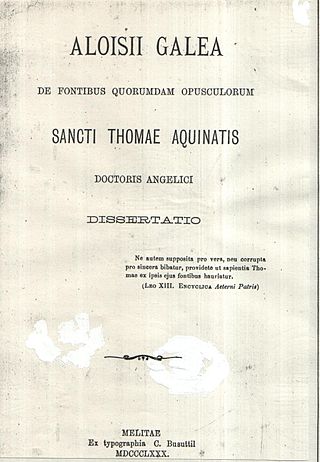
Henry Regnand | |
|---|---|
| Born | |
| Died | |
| Occupation | Philosophy |
Henry Regnand (18th century) was a minor Maltese philosopher who specialised mainly in logic and metaphysics. [1]

Henry Regnand | |
|---|---|
| Born | |
| Died | |
| Occupation | Philosophy |
Henry Regnand (18th century) was a minor Maltese philosopher who specialised mainly in logic and metaphysics. [1]
Little is known as yet about the private life of Regnand. He probably was a Dominican friar, but this is still unconfirmed sufficiently by documentary evidence. As an academic, he flourished during the first decade of the 18th century. At that time, he was active teaching philosophy at the Dominican Studium Generale of Portus Salutis at Valletta, Malta. No portrait of Regnand seems to have survived.
Despite the dearth of biographical data concerning Regnand, we do possess a number of interesting manuscripts which bear witness to his expertise and ability at philosophical speculation. All of these documents are held at the archive of the Dominicans at Valletta, Malta. They are written by Regnand in his neat and beautiful handwriting. All of them are in Latin, and follow the typical style, in content as in methodology, of Scholasticism. Some of his works are interesting philosophical examinations of natural phenomena, especially those observable in outer space. As yet none of them have ever been transliterated, much less translated into any modern language, or even freshly read and studied. They are the following:

Aristotelianism is a philosophical tradition inspired by the work of Aristotle, usually characterized by deductive logic and an analytic inductive method in the study of natural philosophy and metaphysics. It covers the treatment of the social sciences under a system of natural law. It answers why-questions by a scheme of four causes, including purpose or teleology, and emphasizes virtue ethics. Aristotle and his school wrote tractates on physics, biology, metaphysics, logic, ethics, aesthetics, poetry, theatre, music, rhetoric, psychology, linguistics, economics, politics, and government. Any school of thought that takes one of Aristotle's distinctive positions as its starting point can be considered "Aristotelian" in the widest sense. This means that different Aristotelian theories may not have much in common as far as their actual content is concerned besides their shared reference to Aristotle.

Dominic Borg was a minor Maltese philosopher who specialised in logic and rhetoric.
John Matthew Rispoli was a major Maltese philosopher of great erudition. He was held in high esteem by the Grand Masters of the Knights Hospitaller Order, the Bishops of Malta, the Viceroys of Sicily, cardinals, bishops, inquisitors, and the common people. Perhaps the most eminent Maltese philosopher of the Middle Ages, the various extant writings of his are witness to his philosophical aptitude and dexterity as to his high calibre as a philosopher. These qualities were highly appreciated during his lifetime, in Malta as in France and Italy. He lived a busy life, both as an intellectual and as an administrator. He was professor of philosopher at various institutions of high education, an able preacher, and an official at various posts within the Dominican Order, of which his was a member. He was an avid aficionado of music, and was talented with playing musical instruments. Though the fame of holiness accompanied him in his life, this did not deter the Inquisition from suspecting him of heresy, and keeping him in its dungeons for fourteen months. When he died, he was given an almost state funeral.

Jerome Leocata was a major Maltese philosopher who specialised mainly in metaphysics. His long academic career in philosophy and theology was very hampered by his many administrative commitments. His writings, however, bear witness to his thinking skills and his philosophical prowess. He possessed a clear and systematic mind, consistently endeavouring to give a sound philosophical basis to his speculations. No portrait of him is yet known to exist.
Maximilian Balzan (1637–1711) was a minor Maltese mediaeval philosopher who specialised mainly in physics and art. He was also an accomplished theologian. He had a very successful administrative career, both in the civil as well as the ecclesiastical sphere, and he further gave a significant share in academic circles.

Rosarius Mary Hagius (1673–1757) was a minor Maltese philosopher who specialised mainly in metaphysics.
Constance Vella (1687–1759) was a major Maltese philosopher who specialised mainly in physics, logic, cosmology, and metaphysics. Vella's speciality is that, despite being a Scholastic, he was not an Aristotelic-Thomist one, but rather an Aristotelic-Scotist philosopher, that is more in the line of John Duns Scotus.

Henry Ercole was a minor Maltese philosopher who specialised mainly in ethics and logic. He enjoyed great esteem from his contemporaries, both as an administrator and a philosopher.

Gasper Grima (c.1680–1745) was a minor Maltese philosopher who specialised mainly in metaphysics and logic.

John Constance Parnis (1695–1735) was a major Maltese mediaeval philosopher who specialised mainly in metaphysics, physics, and logic.

Stefano Pace (1695–1735) was a minor Maltese mediaeval philosopher who specialised mainly in physics.
Joseph Demarco (1718–1793) was a Maltese medical practitioner, a scientist, and a major philosopher. His areas of specialisation in philosophy were mostly philosophical psychology and physiology.

Saviour Bernard (1724-1806) was a Maltese medical practitioner, a scientist, and a major philosopher. His areas of specialisation in philosophy were mostly philosophical psychology and physiology.
Angelo Pirotta, O.P. was a Maltese philosopher and educator. In philosophy, his areas of specialization were epistemology and metaphysics.

Justus Azzopardi was a minor Maltese philosopher. His area of specialisation in philosophy was chiefly metaphysics. No portrait of him is known to exist as yet.
Jerome Inglott (1776–1835) was a Maltese philosopher and theologian. His areas of specialisation in philosophy were chiefly metaphysics and ontology. He held the Chair of Philosophy at the University of Malta (1822–27), and was one of the Philosopher-Rectors at the same university (1826–33).

George Caruana (1831–1872) was a Maltese minor philosopher mostly interested in epistemology. He held the Chair of Philosophy at the University of Malta (1859–72).

Aloisio Galea (1851–1905) was a Maltese theologian and minor philosopher. He specialised mostly in moral philosophy.
Daniel Callus (1888–1965) was a Maltese historian and philosopher. His main interest was in the history of Medieval philosophy.
Joseph Sapiano (1911–1985) was a Maltese theologian and minor philosopher. In philosophy he was mostly interested in epistemology. He held the Chair of Philosophy at the University of Malta between 1953 and 1971.